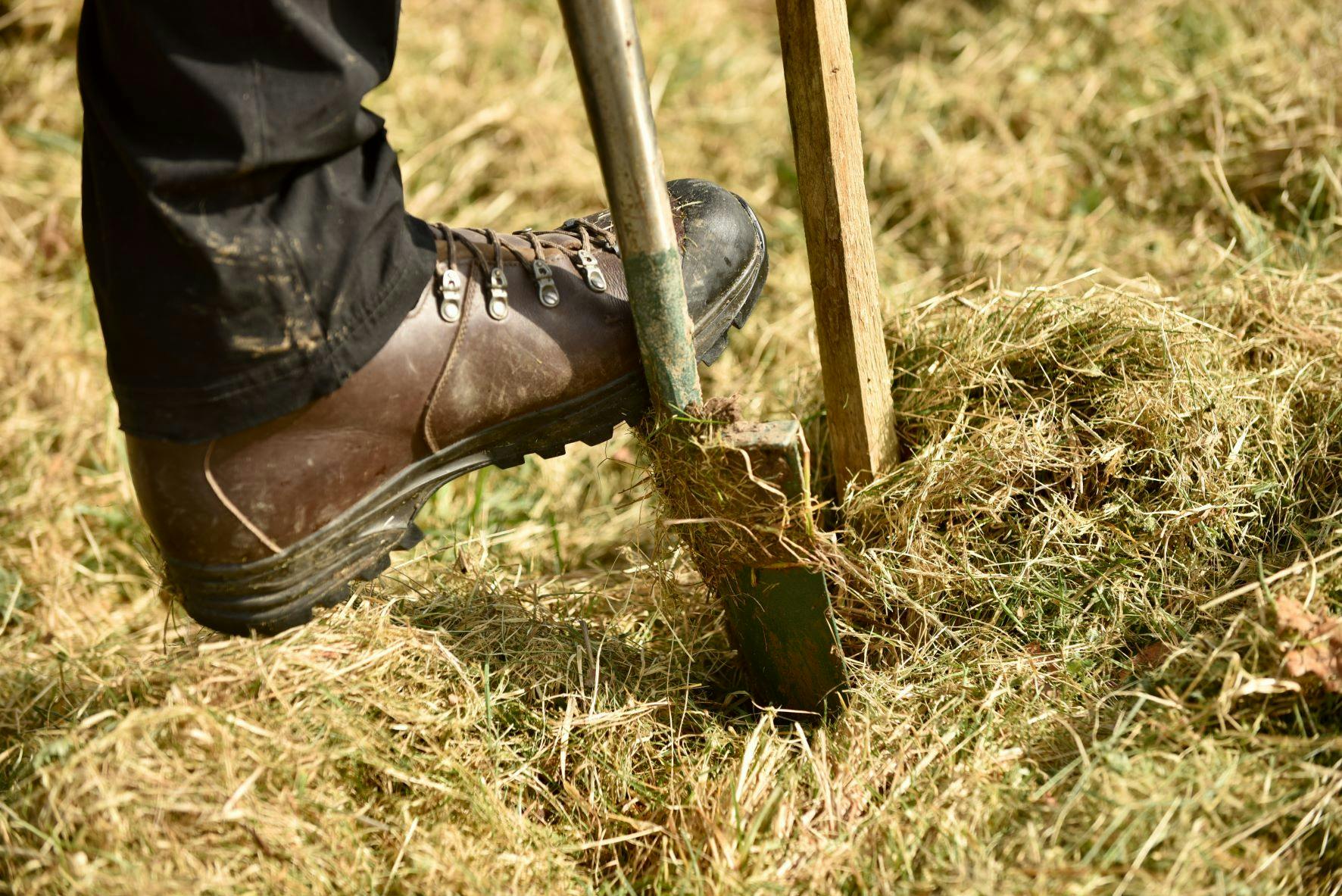Climate Emergency
The Climate Emergency facing our world is a very real issue, but there is plenty we can do to take action to help protect our planet.
Cheshire West and Chester Council declared a Climate Emergency in the borough in 2019 and put forward its Climate Emergency Response plan, which aims to help the borough become carbon neutral by 2045.
This is a space to share ideas, stories and tips about what you are doing locally to reduce your carbon emissions and impact on the environment. Now's the time to react and play your part to make our borough carbon neutral.
The Climate Emergency facing our world is a very real issue, but there is plenty we can do to take action to help protect our planet.
Cheshire West and Chester Council declared a Climate Emergency in the borough in 2019 and put forward its Climate Emergency Response plan, which aims to help the borough become carbon neutral by 2045.
This is a space to share ideas, stories and tips about what you are doing locally to reduce your carbon emissions and impact on the environment. Now's the time to react and play your part to make our borough carbon neutral.
-
How we’re playing our part
Share How we’re playing our part on Facebook Share How we’re playing our part on Twitter Share How we’re playing our part on Linkedin Email How we’re playing our part linkThe Council is committed to making changes across all our services to play our part to tackle the Climate Emergency and it is one of the Council’s seven key priorities, as set out in our Stronger Futures plan.
The objectives that underpin this priority include:
• Reducing the carbon footprint of the Council• Support the decarbonisation of energy, industry and business
• Improve sustainable transport and infrastructure
• Enable low carbon buildings, homes and development
• Enhancing green spaces
• Reduce waste and increase recycling
As an organisation we have a target to be carbon neutral by 2030 and are leading by example to help the borough to be carbon neutral by 2045.
Below are some examples of the work we’ve done so far to help achieve this
-
Wonderful Wetlands: Wetland Conservation and Nature Recovery in west Cheshire
Share Wonderful Wetlands: Wetland Conservation and Nature Recovery in west Cheshire on Facebook Share Wonderful Wetlands: Wetland Conservation and Nature Recovery in west Cheshire on Twitter Share Wonderful Wetlands: Wetland Conservation and Nature Recovery in west Cheshire on Linkedin Email Wonderful Wetlands: Wetland Conservation and Nature Recovery in west Cheshire link
On World Wetlands Day (2 February), Cheshire West and Chester Council is celebrating one of the planets most valuable and yet most threatened ecosystems. Wetlands, including ponds, marshes, wet meadows, and wet woodland, are biodiversity hotspots, natural water filters, carbon stores and valued spaces for people to connect with nature. However, globally, wetlands are disappearing at an alarming rate, with nearly 90% lost in the last 300 years.
Types of wetlands in west Cheshire
West Cheshire is home to a rich and varied network of wetland habitats, shaped by our rivers, low‑lying landscapes and historic land use. These include:
- Ponds and small waterbodies – vital for amphibians, insects, birds and aquatic plants, and especially important in farmed and urban landscapes.
- Rivers and floodplains – including the Rivers Dee and Weaver and their tributaries, with surrounding wet grasslands, reedbeds and wet meadows.
- Marshes and wet grassland – seasonally wet areas that support wildflowers, pollinators and breeding birds such as snipe and lapwing.
- Mosslands, fens and wet woodland – permanently wet habitats that support specialist species and help store carbon.
- Ditches, scrapes and seasonal pools – often man‑made but extremely valuable for wildlife and water management.
Together, these habitats form an interconnected wetland network that is essential for nature recovery across the borough.
 The River Dee
The River DeeWork to protect local wetlands
A range of strategic, conservation‑led programmes are underway across the borough to safeguard and enhance wetlands within Cheshire West.
Local Nature Recovery Strategy
The Cheshire and Warrington Local Nature Recovery Strategy sets out the actions needed to aid nature’s recovery across the county, including restoration, creation and positive management of ponds and broader wetland networks, aiming to reverse decades of ecological decline. Ponds and wetlands are recognised as key elements in the region’s strategic nature recovery network, linking isolated habitats and supporting species movement at a landscape scale.
Ponds and wetlands are also acknowledged for their role in regulating water within the landscape, which is becoming increasingly important as weather patterns grow more extreme. During periods of heavy rainfall, wetland habitats help to reduce flooding by temporarily storing larger volumes of water and slowing the flow across the landscape. At drier times of year, their ability to retain water becomes an essential resource for wildlife, as well as livestock in agricultural areas.
Chester Wetlands
The Council is working in partnership with the Land Trust, Networks for Nature (an initiative led by Chester Zoo), and other stakeholders at the Countess of Chester Country Park to deliver a significant wetland restoration project on the outskirts of Chester. The project will involve re-aligning the existing watercourse to restore the natural meanders and flow, as well as forming scrapes; all of which will help to prevent flooding, improve water quality and create healthy habitats for wildlife and local visitors to enjoy. The wetland will also play a vital role in carbon sequestration, acting as a carbon sink to contribute to climate change mitigation efforts.
District Licensing Scheme for Great Crest Newts
Ponds play an important role in our borough providing habitat that supports amphibians, such as Great Crested Newts, birds, mammals, and invertebrates. Cheshire has one of the highest pond densities in the country and was once known as the pond capital of Europe, however, a lot of the historic ponds have now been degraded or lost.
As part of the Council’s work to address the nature crisis, the Council is acting as the habitat delivery body for Natural England's great crested newt strategic licensing scheme, known as District Level Licensing (DLL). This programme of work aims to maintain the favourable conservation status of great crested newts by creating and enhancing the ponds and surrounding terrestrial habitats that they use.
Under DLL, developers pay a conservation payment, which is then used to create or restore new ponds in strategic areas within the borough. The ponds are secured, monitored, and managed for 25 years – all funded by the developers.
Since the scheme started in 2018, the Council has created and restored over 180 ponds, including 15 in the last 12 months. The Council’s Biodiversity and Green Infrastructure Team continue to monitor these, ensuring they remain healthy and thriving habitats for local wildlife.
The Council is asking landowners and farmers in the borough to come forward if they have any ponds that are heavily scrubbed over or dry, and in need of restoration. There is also the potential to restore ‘ghost ponds’ that were historically present in the landscape. A grant is available to successful applicants to cover the full costs of each pond restoration. Applications must come from within target areas that have been mapped by Natural England, and conform to design specifications for size, depth and profile. More than one third of land in the borough falls within the target area. You can view which areas are included on Natural England's website.
A number of ponds have also been restored on Council owned sites, helping to create healthier ponds that will benefit local wildlife and communities for years to come. Below is a selection of three pictures showing how the work done can really bring ponds back to life. A pond on a Council site before restoration work began
A pond on a Council site before restoration work began The same pond within three months of restoration works taking place
The same pond within three months of restoration works taking place The same pond on the most recent monitoring visit
The same pond on the most recent monitoring visitThe Council’s Biodiversity and Green Infrastructure team can provide support and advice throughout the application process for the DLL scheme. To find out more about the scheme, and to see if you are eligible, please contact the biodiversity team via email: Biodiversity@cheshirewestandchester.gov.uk.
-
Bikeability training is making a huge difference for local children
Share Bikeability training is making a huge difference for local children on Facebook Share Bikeability training is making a huge difference for local children on Twitter Share Bikeability training is making a huge difference for local children on Linkedin Email Bikeability training is making a huge difference for local children link
The Council has been offering Bikeability training to local schools in the borough, through our provider BikeRight, over the last five years.
In 2025 alone 3,500 children have completed their Bikeability training, setting them up to ride safely for years to come.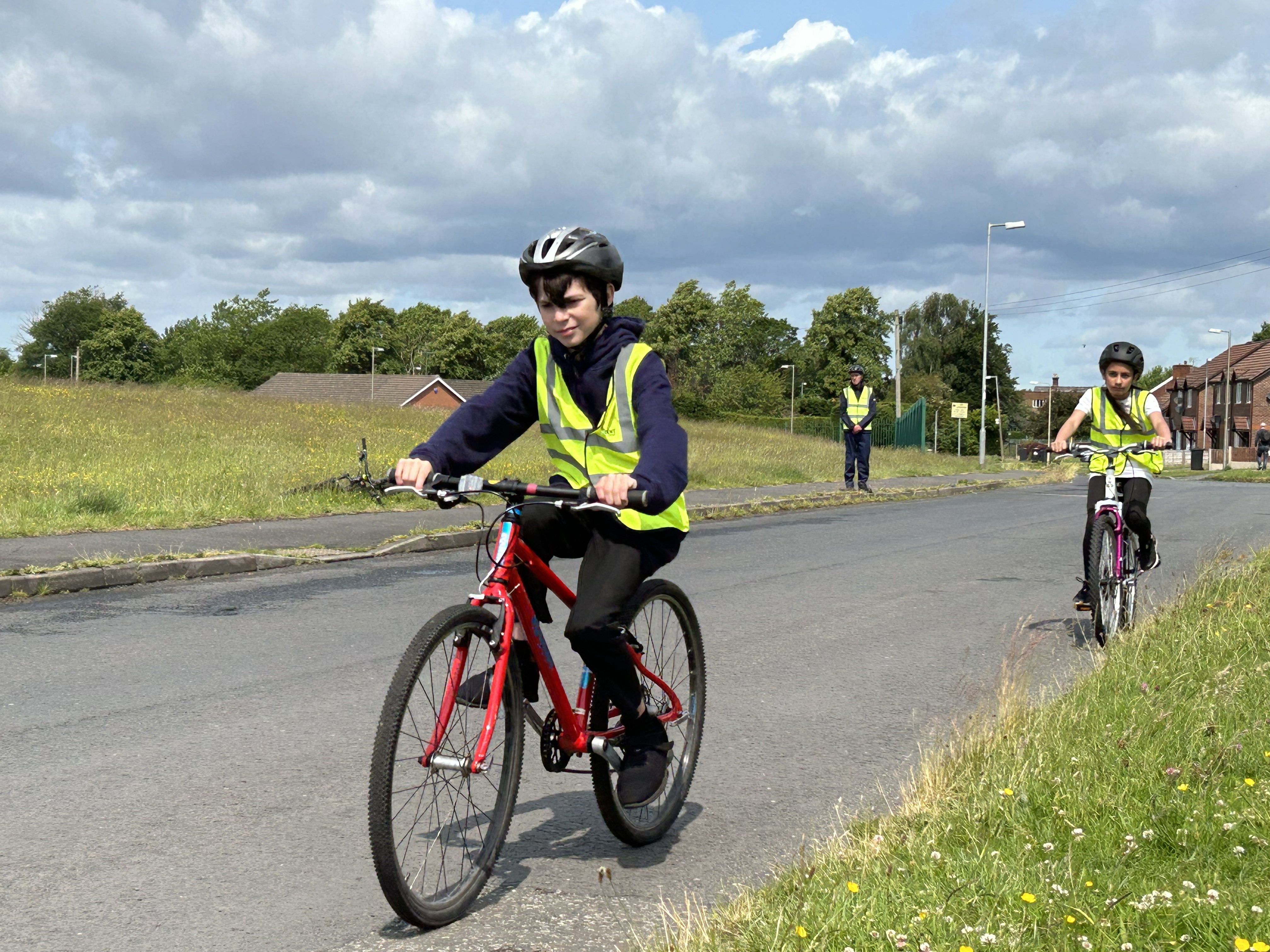
The free training covers a wide range of important skills to ensure that each pupil has the knowledge and confidence to ride safely in the local area.
Recently a parent of a child, who had attended the training at their local primary school, shared their thoughts on how the course had reformed their 9-year-olds cycling habits. We’ve shared the review below, with the child and Bikeability instructor’s details anonymised.
“We are absolutely delighted with the Bikability training my son received, and we can’t thank you enough.My 9-year-old, has come home a completely reformed cyclist. He genuinely loved the course and specifically mentioned how much he enjoyed the instructor’s training.
The most life-changing result? The helmet. I, his mother, have spent years engaging in daily, soul-crushing negotiations over why a helmet is necessary, Now, he simply reaches for it. No debate. No commentary.
The difference, I have concluded, is that while I may possess a lifetime of love and parental wisdom, your instructor (the cool, ex-army instructor who rides bikes all the time) possesses the highly coveted quality of coolness. He explained how dangerous the roads can be and my son finally listened. Lesson learned: I am not cool.
He has picked up fantastic safety tips, like the crucial warning about being aware of parked cars and the dreaded potential for "car-dooring".
This course was perfect for him, and I'm genuinely grateful for the time taken to keep the kids safe."
Moulton Primary School also shared their experience of running Bikeability training in their school. Their PE Coordinator said:
“I am writing in response to the recent email regarding Bikability, and I would like to wholeheartedly confirm that the training provided was outstanding.The pupils who took part thoroughly enjoyed the experience and all reported learning something new. Several pupils who participated in the Level 1 course commented on how inspiring the instructors were and shared that they now feel confident riding a bike, even though some had never ridden one before the sessions.
Pupils who completed both Level 1 and Level 2 courses spoke very highly of the coaches, describing them as caring, supportive, and encouraging. They particularly appreciated that mistakes were treated as learning opportunities, with coaches offering guidance rather than being strict, helping them to overcome challenges with confidence.
Many pupils also commented on feeling much safer on the roads as a result of the high-quality teaching and said they now feel more confident undertaking longer-distance bike rides. There was an overwhelming amount of positive feedback from all pupils, highlighting how much fun they had and how exhilarating the entire experience was.From the bottom of our hearts, thank you and well done to the coaches, the team, and everyone involved in supporting the pupils. This was a truly memorable experience and something the pupils at Moulton School will never forget.”
If you want to find out more about how cycle training has changed since you were in school and the offer of free Bikeability training in the borough, visit: Bike Right’s website for more information.
Alongside the free school Bikeability training, there is also free adult and family cycle training available which can be adapted to suit your cycling level and the area where you are likely to cycle regularly.Make 2026 the year you dust off your bike and take the time to refresh your cycling skills.
-
Tips for a sustainable Christmas
Share Tips for a sustainable Christmas on Facebook Share Tips for a sustainable Christmas on Twitter Share Tips for a sustainable Christmas on Linkedin Email Tips for a sustainable Christmas link
The festive season is a time for celebrating and spending time with your nearest and dearest. With so much going on, sustainable options might not be top of your list and you might find that you end up with increased waste and items that you might not want or need.
Here are a few simple ideas to help you to enjoy the festive season, whilst protecting the planet and without wasting resources.
Reduce food waste
Christmas is the peak season for food waste, with thousands of tonnes thrown away across the UK. Here are some ideas to help you cut down on waste.
- Plan your meals: Make a shopping list and stick to it. Avoid impulse buys and “buy one, get one free” offers unless you’ll use them.
- Use leftovers creatively: Turn turkey into sandwiches or curry, and use vegetables in soups, pasta sauces or stews. Check out the Love Food Hate Waste website for leftover recipe ideas.
- Recycle unavoidable waste: Place scraps in your brown food bin for weekly collection so your leftovers can be recycled into energy for our homes and schools. Find out what can be recycled: Your bin collection. You can also order a free brown food caddy on the Council’s website if you do not have one.
- Eat with the seasons – lots of our favourite foods at this time of year are in season, such as potatoes, sprouts, carrots and leeks. Do your research and make the most of eating local, seasonal food. Read the Soil Association’s seasonal food guide.

Recycle right
- Wrapping paper and cards: Avoid foil or glitter—they can’t be recycled. Plain paper and cards can go in your recycling bin. Find out what can be recycled in your home recycling bins.
- Excess recycling: If your bin is full, place extra recycling securely next to it for collection.
- Christmas trees: Real trees can be recycled at Household Waste Recycling Centres or designated sites across the borough. Find out more here.
- Recycle batteries correctly: Loose and hidden batteries caused over 1,200 fires in collection vehicles and at waste sites across the country. Make sure you leave your batteries and electricals out for collection in a separate container. If batteries can’t be removed from a device, recycle the whole items at your local recycling centre.

Buy only what you need
Consumerism peaks at Christmas, but many presents and other Christmas items can be unwanted and end up being thrown away.
- Choose quality over quantity for gifts.
- Consider second-hand, homemade or upcycled items. If you are looking for a bike for Christmas Bren Bikes has a great selection of second-hand bikes.
- Support the circular economy by repairing, reusing, and donating items instead of discarding them.
- The most sustainable decorations are the ones you already have, if you’re looking for something new, why not make your own or upcycle existing ones.

Shop locally
- Support local independent shops – aim to buy your presents and produce from a local, independent business. This means that your money stays in the local economy, supporting local families.
- Support local markets – we have markets in Chester, Ellesmere Port, Northwich, and Winsford, each offering a wide range of fresh produce, handmade gifts, and unique goods. Find out the markets opening times.
- Visit a local Christmas Market to buy unique gifts, crafts and seasonal produce. Chester Christmas Market runs until 22 December.

Sustainable transport
- If you are heading into Chester consider using the Park & Ride service from Wrexham Road, Boughton Heath, or Upton. Tickets cost just £5 for up to five people, and there are late-night services before Christmas.
- Consider walking, cycling, or public transport for local trips. Use Traveline to plan your trip on local public transport and the cycle and walking journey planner on the Council’s website to help plan your trip.
- If you are gifting a bike for Christmas, or receive one yourself, why not consider signing up for free cycle training? BikeRight! our cycle training provider offer both family and adult cycle skills sessions. Find out more on the Council’s website.

Host a sustainable party
- Avoiding single-use plastics when planning your party.
- Hire party supplies – Local environmental group, Eco Communities, hire out reusable party kits – find out more.
- Re-wear your Christmas jumper – 95 per cent of Christmas jumpers are made using plastic so swap, buy second-hand or re-wear your jumper year after year. Environmental charity Hubbub, even has a guide to make your own sustainable Christmas jumper.
If you have any other ideas or tips you can share what you do on the Your Story section of the Climate Emergency Inspire Hub.
-
Cheshire and Warrington to Target Highest Economic Growth Rate in the North Under New 20-Year Strategy
Share Cheshire and Warrington to Target Highest Economic Growth Rate in the North Under New 20-Year Strategy on Facebook Share Cheshire and Warrington to Target Highest Economic Growth Rate in the North Under New 20-Year Strategy on Twitter Share Cheshire and Warrington to Target Highest Economic Growth Rate in the North Under New 20-Year Strategy on Linkedin Email Cheshire and Warrington to Target Highest Economic Growth Rate in the North Under New 20-Year Strategy link
Cheshire and Warrington will drive towards becoming the UK's healthiest, most sustainable, inclusive and fastest-growing region by 2045, following approval of an ambitious economic strategy by the area's Combined Authority Shadow Board.
The board has backed the Sustainable and Inclusive Economic Strategy (SIES), a blueprint to deliver the highest rate of economic and productivity growth in the north, slash carbon emissions by 4.5 million tonnes annually by 2030, and expand access to transport, digital infrastructure and quality housing while reducing poverty.
The strategy harnesses the region's existing economic firepower—nearly one million residents and over 41,000 businesses including national strengths in clean energy, life sciences and advanced manufacturing—to accelerate clean energy leadership, restore nature, and create opportunities for all.
Councillor Nick Mannion, Deputy Chair of the Cheshire and Warrington Combined Authority Shadow Board and Leader of Cheshire East Council, said: "We're building from a position of strength, with productivity already outpacing the rest of the North West and the national average. Devolution gives us the tools to turn that advantage into transformational growth, with more local control over the decisions that shape our communities' futures in both rural and urban areas."
The strategy arrives as the region prepares to establish a Mayoral Combined Authority in early 2026, unlocking at least £650 million in funding over 30 years and transferring key powers over transport, economy and skills from Whitehall to local leaders. Residents will elect their first Mayor in May 2027.
Developed through summer consultation and backed by expert analysis, the 81-page blueprint maps how regional leaders will partner with government and business to deliver the vision.
Read the SIES report in full HERE.
For more information about the Cheshire and Warrington devolution programme, visit cheshireandwarringtondevolution.com.
-
Council extends funding round to help bring community projects to life
Share Council extends funding round to help bring community projects to life on Facebook Share Council extends funding round to help bring community projects to life on Twitter Share Council extends funding round to help bring community projects to life on Linkedin Email Council extends funding round to help bring community projects to life link
Cheshire West and Chester Council has extended the latest Cheshire West Crowd funding round, with funding available for community projects across west Cheshire.
Run by the Council in partnership with Spacehive, the Cheshire West Crowd enables community-led projects to bring ideas to life, making the borough more vibrant, resilient and connected.
Two Council funding pots in this latest funding round still have funds available. The Community Innovation Fund has just over £58,000 remaining, and the Climate Change Emergency Fund – £42,000 remaining. The average pledge by Cheshire West and Chester Council to successful projects, to date, has been 50% of their funding target (in the region of £5,000 to £10,000).
Since the Cheshire West Crowd first launched in 2021, 192 community led projects have successfully raised £2.8 million funding, enjoying the support of almost 10,558 backers.
Councillor Paul Donovan, Cabinet Member for Democracy, Workforce and Communities, said: “We’re delighted to be able to extend the latest funding round, pledging more funds to community projects.
“The Cheshire West Crowd has been very successful, making a real difference to community led projects and the people they support.
“The platform is easy to use and this type of crowdfunding is flexible as not only can projects pitch to the Council for funds, but they can also call on the support of their own community and generate real community spirit.
“I’d encourage anyone with an idea about how we can make west Cheshire a better place for people to live to use the Cheshire West Crowd.”
An average campaign funding target is £10,000. Larger crowdfunding campaigns can be successful if they have pre-campaign funding in place and a strong campaign plan and if project creators have considered and applied for multiple sources of funding.
Cllr Donovan added: “You can create a project easily, with plenty of support available from Spacehive and the Council’s Communities team on your crowdfunding journey.”
An on-line workshop will be held on 2 December at 12 noon providing an opportunity for would-be project creators to hear more about the Cheshire West Crowd and how community led projects have benefitted from the initiative in the past. To register for the workshop, use the link below:
For the Climate Change Emergency Fund, projects are encouraged to email: climatechange3@cheshirewestandchester.gov.uk. You’ll then be able to discuss your potential project with the Council’s Climate Change Emergency team so you can tailor it and improve the likelihood of receiving the Council’s support through this fund. Previous projects have included the installation of solar panels, LED lights and insulation.
The deadline for projects to be verified by Spacehive and live on the Cheshire West Crowd, which also includes pitching for Council funds, is Wednesday 29 January 2026.
Funding panels will take place early in March 2026, and projects should aim to hit their crowdfunding targets in April 2026.
-
New multimillion pound waste treatment facility brings opportunity for local waste prevention initiatives
Share New multimillion pound waste treatment facility brings opportunity for local waste prevention initiatives on Facebook Share New multimillion pound waste treatment facility brings opportunity for local waste prevention initiatives on Twitter Share New multimillion pound waste treatment facility brings opportunity for local waste prevention initiatives on Linkedin Email New multimillion pound waste treatment facility brings opportunity for local waste prevention initiatives link
The Council are soon to invite a small number of companies to bid for the next waste treatment contract. The winning bidder will be responsible for treating the waste that residents put in their black bin.
The contract is worth over £8 million pounds a year and will run for at least seven years. All bids the Council will consider must demonstrate how their organisation will enhance social value in the local area. In line with the Council’s 10-year waste management strategy, bidders will be encouraged to support community led initiatives across west Cheshire.
The Council intend to signpost bidders towards local projects that need financial support or other resources, such as advice.If you are part of a local group, school project, CIC or registered charity, you are invited to submit your “ask” to the Council for inclusion in the information we provide bidders. This does not guarantee that you will be selected by the bidders, but it gives you an opportunity to showcase your project and explain what community and environmental benefits your project delivers in the local area. Bidders may then contact you if they would like to support your project as part of their tender submission.
The contract starts in April 2027, so any support would only be provided by the winning bidder after this date. Bidders will be keen to show they would like to make a difference during the life of the contract.
Examples of projects that could be supported include: Repair services and repair skills development / re-use / upcycling / training for food waste reduction initiatives / home compost initiatives / loan of equipment (library of things) / reduction of single use plastic. This list is not exhaustive and wider environmental projects, including those involved in developing skills, training and employment opportunities/ helping to improve well-being / social integration can be included in the signposting document.
Your submission should be no more than 500 words and may include links to your website or supporting documents. You should outline the type of support your project needs, and the expected duration of the project, as well as highlight the objectives and expected outputs.
Your submission must include the contact details the bidders may use to find out more about your project.
Please submit your information by 24 November to: serviceliaisonteam@cheshirewestandchester.gov.uk
Please use the email title: Waste Treatment Social Value Signposting [name of project]
-
West Cheshire sustainability event sets out a greener and fairer future for the borough
Share West Cheshire sustainability event sets out a greener and fairer future for the borough on Facebook Share West Cheshire sustainability event sets out a greener and fairer future for the borough on Twitter Share West Cheshire sustainability event sets out a greener and fairer future for the borough on Linkedin Email West Cheshire sustainability event sets out a greener and fairer future for the borough link
Leaders from across the public, private and third sectors came together earlier this week to explore how nature-based solutions, community spirit and innovation is helping west Cheshire become a net-zero borough and is building a greener, fairer future for all.
The West Cheshire Action on Climate and Nature event, hosted and funded by Cheshire West and Chester Council and Chester Zoo, took place on Monday 3 November, at the start of Green Careers Week - a national event that highlights the opportunities for young people to have a career that can make a difference by helping to preserve or restore the environment and the planet. Members of the Chester Zoo Youth Board and Cheshire West's Youth Panel join Cllr Louise Gittins, Eunice Simmons from the University of Chester and Steve Illidge and Kirsten Pullen from Chester Zoo at the event
Members of the Chester Zoo Youth Board and Cheshire West's Youth Panel join Cllr Louise Gittins, Eunice Simmons from the University of Chester and Steve Illidge and Kirsten Pullen from Chester Zoo at the eventYoung people from Chester Zoo’s Youth Board and Cheshire West's Youth Senate led a panel discussion about green skills, discussing how young people can get involved in conservation or climate action and take their first steps into careers in these fields.
The event also provided an opportunity to highlight a range of projects already making a difference to address the climate and nature emergency in the area. From Chester Zoo’s Networks for Nature partnership, which is driving nature recovery across 60 square miles in the area, to a green skills project that will upskill clean energy sector workers.
The latest Climate Emergency Response Plan for the borough was also launched by the Leader of Cheshire West and Chester Council, Councillor Louise Gittins, at the event. The plan sets out how greenhouse gases can be reduced in the borough, how the area can adapt to the impacts of climate change and biodiversity can be improved for the benefit of people and nature.
The borough wide plan includes a series of actions, split across six different themes, setting out how the Council will achieve its goals. This includes both the direct actions that the Council will take within its services, and the areas where the Council will seek to work with residents, businesses, stakeholders and government to influence the wider state of the borough.
Councillor Louise Gittins, Leader of Cheshire West and Chester Council, said: “This event was about turning ambition into action. Celebrating the steps already taken in the borough to tackle the climate and nature emergencies and highlighting the opportunities to collaborate further to create green growth, job opportunities for local people and a borough where nature can thrive.
“As a borough we’ve already made good strides on our journey to become net zero by 2045. The key to this success is collaboration and innovation, with a wide range of partners, businesses, local organisations and communities working together to create a greener, healthier place for us, and future generations, to enjoy.”
 Panel discussion about nature recovery
Panel discussion about nature recoveryChief Conservation Officer and Deputy CEO at Chester Zoo, Kirsten Pullen, said:
“Chester Zoo was proud to host, and co-launch, the Climate Emergency Response Plan alongside Cheshire West and Chester Council as meaningful action on climate change and biodiversity loss cannot happen in isolation.
“The event isn’t just about unveiling a document - it’s about reaffirming our shared commitment to save biodiversity, prevent extinction of species and encourage habitat growth. We can’t save a species without looking at the impact of climate change, and this plan gives us a blueprint on meaningful action for wildlife and climate change - and real hope for the future.
“We’re pleased with the plan’s commitment to species recovery, increasing biodiversity, improving access to nature, and restoring habitats, all of which supports our conservation charity’s mission to prevent extinction.”
A summary version of the West Cheshire Climate Emergency Response Plan can be viewed online: westcheshireclimateplan.co.uk
Residents, community groups and local businesses taking action to address the climate and nature emergencies are encouraged to add their stories to the Climate Emergency Inspire Hub: cheshirewestandchester.gov.uk/tackleclimate -
Local nursery benefits from decarbonisation grant funding
Share Local nursery benefits from decarbonisation grant funding on Facebook Share Local nursery benefits from decarbonisation grant funding on Twitter Share Local nursery benefits from decarbonisation grant funding on Linkedin Email Local nursery benefits from decarbonisation grant funding link
Background
Ash Tree Day Nursery, run by Chestnut Nursery, is a premier childcare facility situated in the heart of the Blacon community. Offering full and part-time nursery places, pre-school, after-school club and holiday club services for children aged 0 to 11 years, Ash Tree provides comprehensive childcare solutions to meet the diverse needs of local families. As childcare providers, they are continuously looking at the future and the impact humanity is having on our planet. By reducing emissions, they hope to set an example for others to follow.
Support
Groundwork, a charity that support local communities and businesses to build capacity and resilience, was appointed as the delivery partner for Cheshire West and Chester's UKSPF grant programme. The UKSPF programme provided Chestnut Nursery with a decarbonisation grant which was matched funded by the business. Groundwork assisted the business with their grant application process, including:
- Visiting the site to review all their energy consumption measures, specifically electricity.
- Calculating their carbon emissions and undertaking a cost/benefit analysis for solar panels
- Developing an action plan and business case for investment
Outcomes
As a result of our support, Chestnut Nursery was able to install solar panels on their roof, offsetting all of their electricity consumption for the three sites in Blacon and Saughall, saving them £29,670 in cost savings and 13 tCO2e in carbon savings.
 Solar panels on the roof of the nursery
Solar panels on the roof of the nurseryJason, from Chestnut Nursery, said: “We are now producing enough electricity to offset the consumption of all three of our settings in Blacon and Saughall. Without your assistance and the grant money made available by Cheshire West via Groundwork, we would never have made it to this point.”
To read more case studies from local businesses who have been supported with decarbonisation projects, please visit Groundwork’s website.
-
Woodland and habitat creation on Council owned land
Share Woodland and habitat creation on Council owned land on Facebook Share Woodland and habitat creation on Council owned land on Twitter Share Woodland and habitat creation on Council owned land on Linkedin Email Woodland and habitat creation on Council owned land link
Cheshire West and Chester Council has a strong background in woodland establishment, tree planting and habitat creation and continue to be a strategic partner of The Mersey Forest, Cheshire and Merseyside’s Community Forest.
Over the last four years, new woodlands have been created across three sites in the borough, in Wervin, Picton and at Grange Farm, thanks to funding through the national Trees for Climate programme, helping to boost biodiversity and contributing to Cheshire’s Local Nature Recovery Strategy. The trees at Grange Farm site are growing well, despite the dry summer
The trees at Grange Farm site are growing well, despite the dry summerThis winter, four sites will begin to be planted on Council owned land, with an estimated 200,000 trees going in the ground for phase one. A site in Picton, next to the M53, will include riparian planting along a brook on the site, plus a series of natural flood management interventions, which will decrease the risk of flooding on the site and in the wider catchment.
There will also be innovative tree conservation projects on sections of this site, with Sequoia sempervirens, the Coast Redwood under threat from wildfires in its native America, and the native Common Ash resilience program - using natural colonisation to select specimens resilient to Ash Die Back. The aim is to preserve two species from disease and climate change (1 in 3 tree species is under threat of extinction - BBC 2023). The Picton site when planted will also help with noise and traffic pollution in the area as it matures.
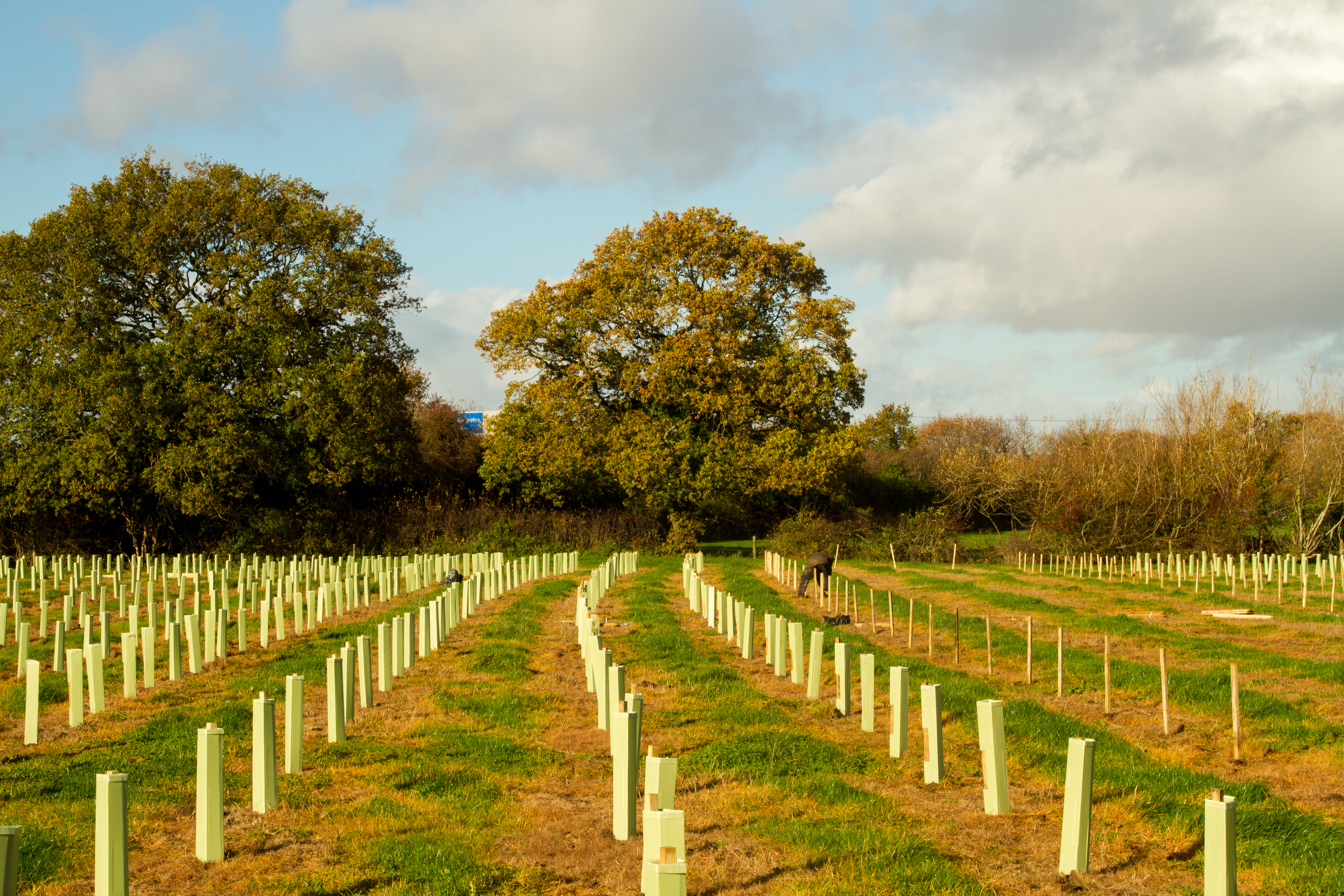
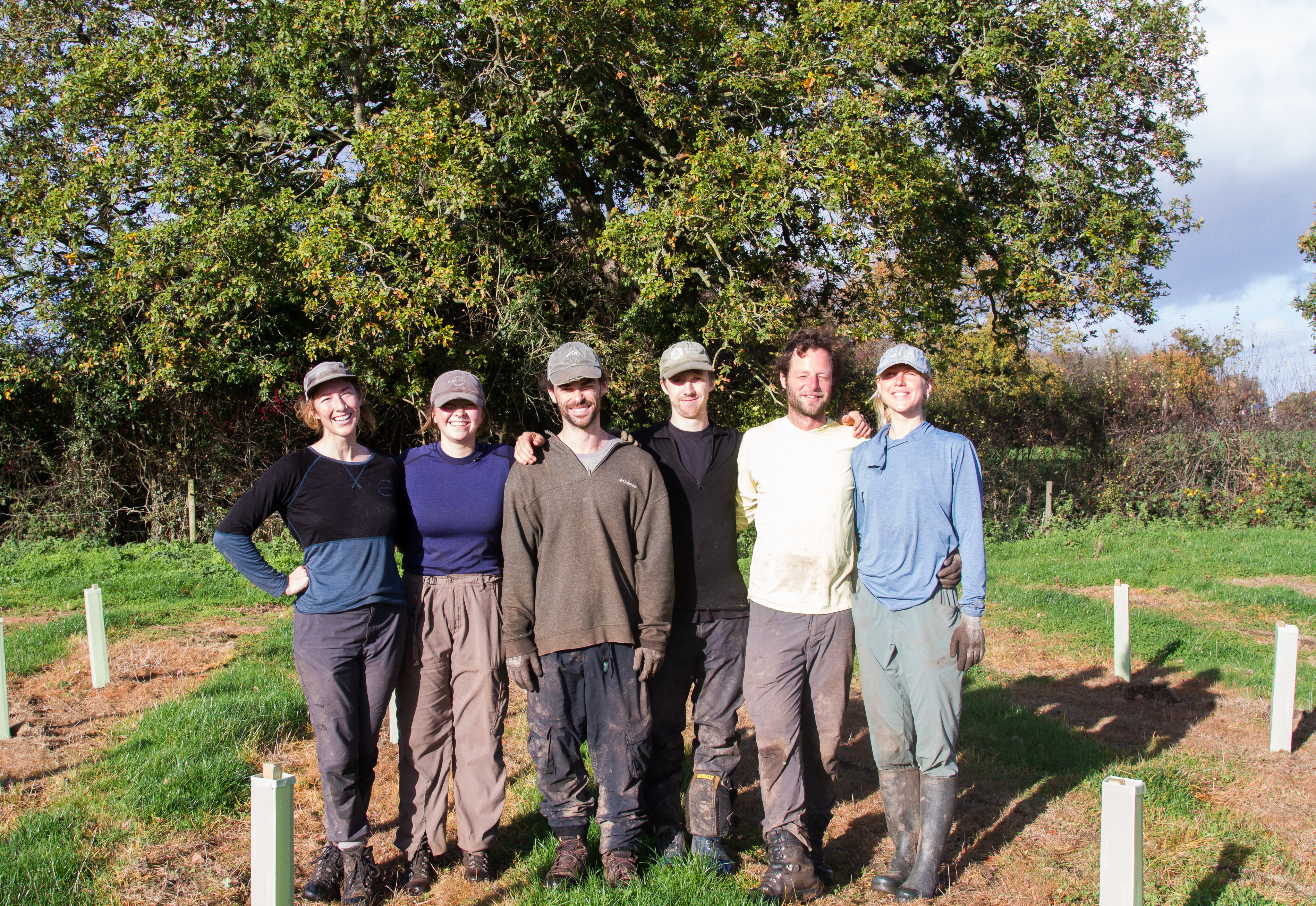

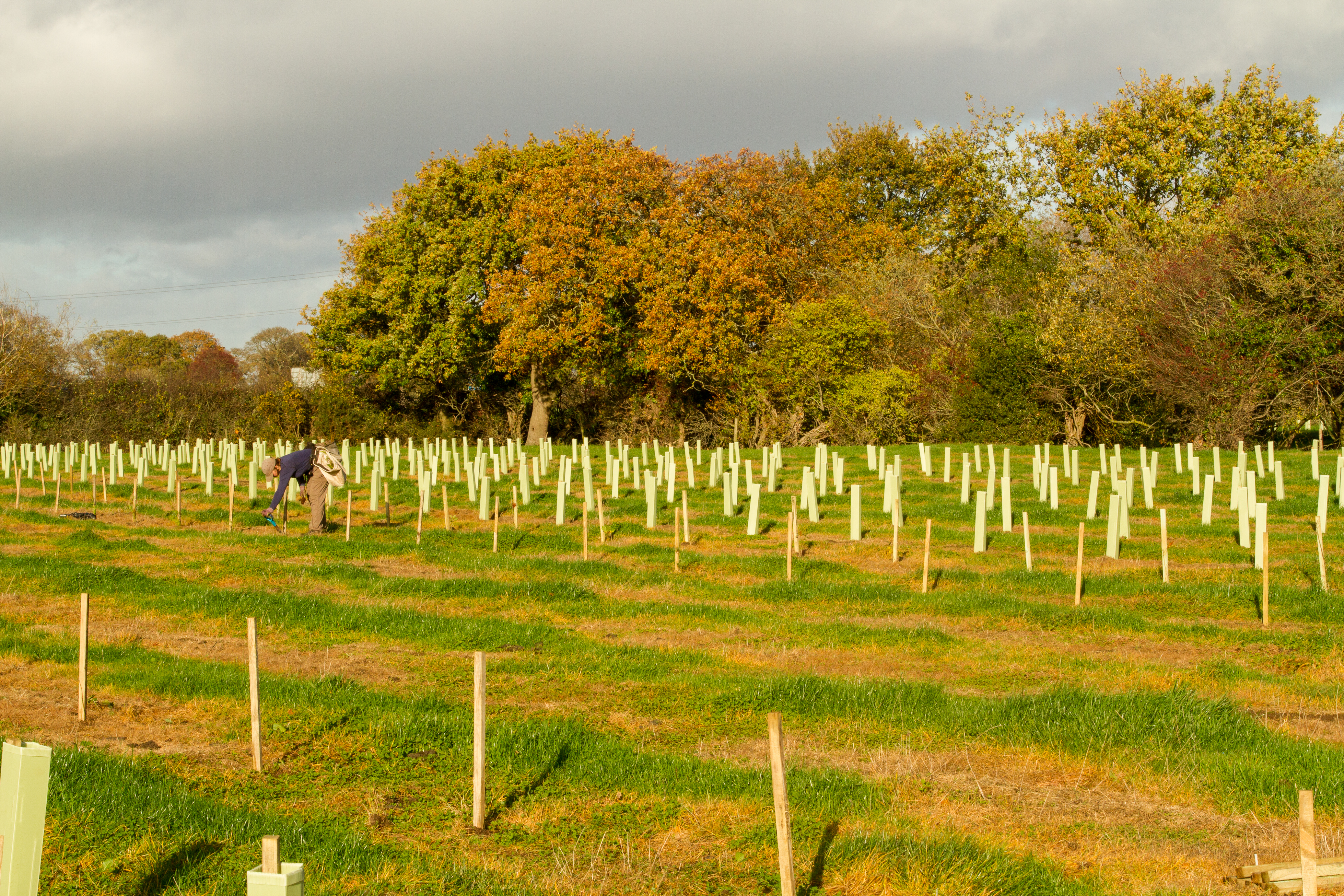
The new woodlands are part of a strategy to create a ‘safe space for nature’, incorporating a wide range of complimentary habitats such as wetlands and bodies of water (ponds, ephemeral ponds and scrapes), grassland and wood pasture with a diverse species of flora, hedgerows and protection of veteran/aging trees.

Existing woodlands have been incorporated within the designs and will be managed for disease and climate resilience using established silvicultural systems. The combination of the diverse habitats and ecotones will maximise opportunities for flora and fauna to occupy, flourish and disperse along habitat corridors.A system of monitoring species, changes in floristic composition, invertebrates, bird populations and mammals is established and is part of the Biodiversity Net Gain Habitat Monitoring and Management Plan. All woodlands and forests created are also registered to be part of the Local Nature Recovery Strategy.
All the small woodlands that have been planted to date are showing increases in fauna, with invertebrate populations improving in diversity and numbers, especially dragon and damsel flies and butterflies. A pair of Barn Owls have also been spotted at one of the woodland sites.
- Carbon Sequestration
The woodlands are part of the Cheshire West and Chester Council's climate strategy and the combined areas will sequester approximately 76,000 tonnes of carbon by year 30.
- Linking people with nature
Linking people with nature is an important part of aim of the woodland creation. The sites have an all-year program of volunteering and educational opportunities that allow volunteers to enhance and maintain the woodlands and be part of species monitoring. The sites are being assessed Forestry and Ecological training.
- Sustainable silviculture
The woodlands are managed by a continuous cover silvicultural system with small parcels of high quality of timber and forest products. By selective felling and long-term rotations (60 -100 years) within sub compartments and combined with a 15-year coppice regime, the woodland will provide revenue for management. The silvicultural system used will eventually create a diverse age and canopy structure vital to support biodiversity across the sites. The forest designs have been carefully considered to be able to respond to future tree diseases and climate threats, allowing species changes without compromising the woodland as a whole.
Hear more about the Council's woodland creation projects in the video below.Local landowners interested in planting new woodlands on their land can find out about local grants available by contacting The Mersey Forest.
Useful information about the Climate Emergency in west Cheshire
- 2025 - 2030 Climate Emergency Response Plan
- Summary of west Cheshire's Climate Emergency Response Plan (2025 - 2030)
- Climate Emergency Response Plan (2021 - 2025)
- Cheshire West and Chester Council's Carbon Management Plan
- Council's response to the Climate Emergency declaration
- Anthesis Report Climate Emergency Strategy Support
Sign up to the Climate Emergency enewsletter
Sign up to our monthly Climate Emergency enewsletter to find out about projects on climate action in the borough.
Useful websites and resources
Key Dates
West Cheshire environmental groups
There are lots of community groups across west Cheshire taking action to protect the environment and share their knowledge around addressing the climate crisis. To find out more click here.
Minutes from Climate Emergency Taskforce Meetings
-
 Climate Taskforce Minutes February 2023.pdf (273 KB) (pdf)
Climate Taskforce Minutes February 2023.pdf (273 KB) (pdf)
-
 Climate Taskforce Minutes March 2022.pdf (83.6 KB) (pdf)
Climate Taskforce Minutes March 2022.pdf (83.6 KB) (pdf)
-
 Climate Taskforce Minutes 17 November 2021.pdf (87.4 KB) (pdf)
Climate Taskforce Minutes 17 November 2021.pdf (87.4 KB) (pdf)
-
 Climate Taskforce Minutes 6 October 2021.pdf (150 KB) (pdf)
Climate Taskforce Minutes 6 October 2021.pdf (150 KB) (pdf)
-
 Climate Taskforce Draft Minutes 26 July 2021.pdf (184 KB) (pdf)
Climate Taskforce Draft Minutes 26 July 2021.pdf (184 KB) (pdf)
-
 Climate Taskforce Draft Minutes 25 May 2021.pdf (158 KB) (pdf)
Climate Taskforce Draft Minutes 25 May 2021.pdf (158 KB) (pdf)
Accessibility
Council information is also available in audio, Braille, large print or other formats. If you would like a copy in a different format, please click here.
Privacy and moderation
- This page is moderated to make it a safe space for everyone
- To help with this people are asked to register and sign in to take part
- It is a public space so please be kind
- Don’t share detailed personal information about yourself or others
- Contributions represent people’s own views and not a recommendation or endorsement by the Council.
- If you would like to know more about how we use and store the information you give us, please read our privacy notice.


